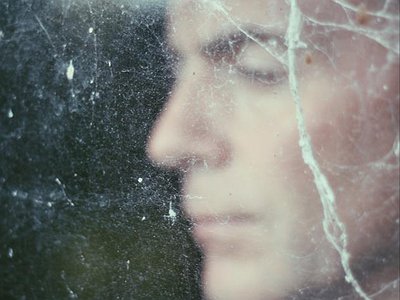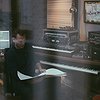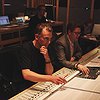Name: IN-IS (Sheridan Tongue)
Occupation: Composer
Current Release: Seven Days on NW1 Records
Musical Recommendations: Iskra String Quartet, Tom Poster
Website: If you enjoyed this interview with Sheridan Tongue, you can find out more on his website.
When did you start writing/producing music - and what or who were your early passions and influences?
When I was a teenager my parents had a copy of Mike Oldfield’s Tubular Bells album and the LP gate fold and artwork amazed and inspired me. There was a picture of Mike Oldfield in his studio surrounded by instruments that he played all himself – from then on I knew that is what I wanted to do.
I started writing instrumental tracks around that time and recorded them using an old cassette tape recorder. I accidently discovered that if I took the erase head out of the machine then every time I recorded something new it overdubbed the recording on top of the previous take. It was a very simple form of multitracking. It enabled me to build up multilayered tracks.
As a teenager I also built a monophonic synth from a kit that was sold through a magazine called Hobby Electronics. The keyboard was made of bell push buttons and could produce a sine and saw wave and record simple one track sequencing. It was amazing to me, and I still have it sitting on the shelf in my studio.
I was really into artists and bands that used orchestral elements in their tracks (Eighth Day By Hazel O’Connor), and artists/producers that experimented with sounds and new production techniques (Kraftwerk, Trevor Horn, Brian Eno, Isao Tomita)
For most artists, originality is first preceded by a phase of learning and, often, emulating others. What was this like for you? How would you describe your own development as an artist and the transition towards your own voice?
I worked in the pop world for many years as a remixer, arranger, keyboard player, programmer and producer. I did not realise it at the time but it gave me a fantastic foundation on which to build a career as a composer.
I worked with many different artists and producers and at the end of recording and mix sessions I would often go back into the studio late at night when they had all gone home, switch all the gear back on, and work on my own tracks through the night. At that time I did not have my own home studio or equipment.
Over the course of many years I built up a CD of my own compositions and when the opportunity arose I would play it to people in the music industry. This led to my first proper composing job as a composer of music for commercials and short films for a music production company in London called Natural Sound Source.
That also gave me a huge amount of experience, as quite often advertising agencies wanted tracks that emulated the sound of artists and bands of the time - but usually combining genres and styles. I got used to working to tight deadlines and having to produce music to a very high quality.
I look at it now as a solid foundation for my original works that I am now producing as IN-IS, and my soundtrack work.
What were your main compositional- and production-challenges in the beginning and how have they changed over time?
In the beginning I had no studio. My first “proper” recording set up was based around an Akai S900 sampler and a Korg M1 with an 8 track sequencer built into the keyboard. I learnt everything possible about both these pieces of kit. And this has always been my mantra for tech gear: build up a studio slowly getting to know each piece of gear really well.
The studios I worked in all had 24 track 2” analogue tape machines so I learnt a lot about the craft of recording techniques. I think the 1990s was the peak time for recording studios in London and it was wonderful to be on that wave and working in many different studios.
However it is fantastic to now have my own studio set up permanently.
Tell us about your studio, please. What were criteria when setting it up and how does this environment influence the creative process? How important, relatively speaking, are factors like mood, ergonomics, haptics and technology for you?
I do like my working environment to have a very creative and productive feel – it is very important to me. I also like a very ergonomic set up with everything easily accessible. Spending too long trying to get an input from an analogue keyboard to work can really kill the creative process.




